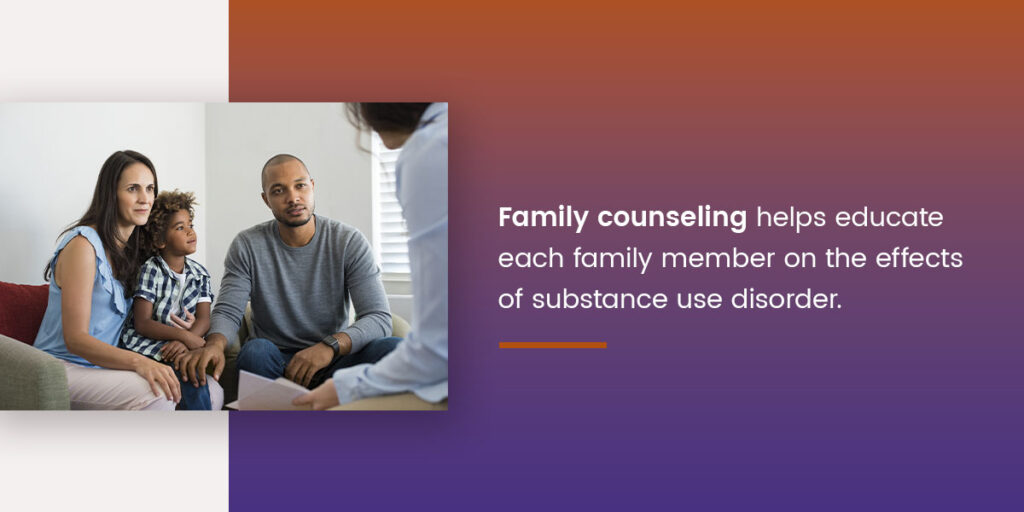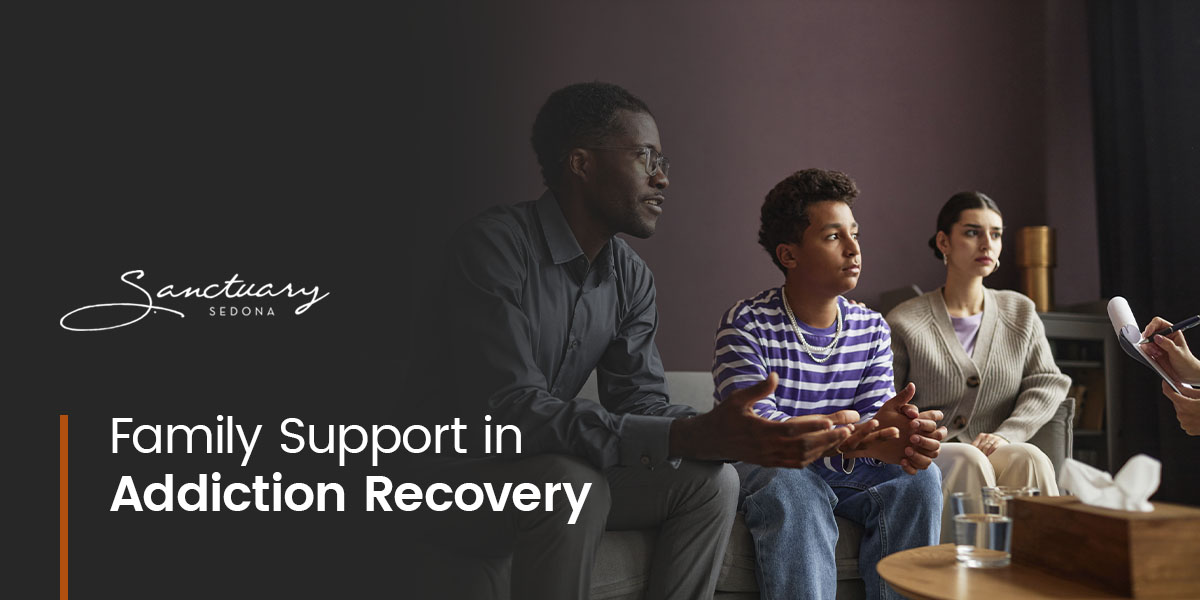Family Support in Addiction Recovery
The impacts of addiction tend to affect the loved ones of the afflicted individual in profound and devastating ways. As with many other diseases, the symptoms and effects of substance use disorder directly impact loved ones. While any member of the family can endure heartbreak at the early signs of substance misuse, the long-term impacts can throw an entire family system off balance.
Family members often become unintended victims of their loved one’s addiction as they battle overwhelming emotions and try to cope. But this doesn’t have to be the case. Families can work together to play a positive role in addiction recovery and ultimately uphold a healthy home environment.
In this article, we’ll explore the impacts of addiction on family systems and the benefits of family addiction support.
Dealing With Addiction in the Family
Family is often one of our most essential sources of physical and emotional support. While family environments can nurture positive behaviors and emotional stability, family systems can also fail and become dysfunctional. When faced with devastating and difficult situations, dynamics can shift as members attempt to cope. In some cases, financial difficulties can arise and strain family systems. In others, addiction can throw the family ecosystem out of balance.
A family member battling addiction can affect the entire family on every level, from emotional and psychological to financial and social. Addiction undermines the trust and love that holds functional family systems together. In some cases, children may feel forced into parental roles. Meanwhile, guardians may feel powerless, or siblings fall into the pits of mistrust as they attempt to cope with a family member struggling with addiction.
Family Roles in Addiction
When addiction sets its roots in a family, each member may find themselves filling a dysfunctional role unintentionally. While this is not always the case, a family affected by addiction may take on these roles in an attempt to cope:
- The enabler: This member attempts to downplay the behaviors of the individual battling addiction. The enabler may make excuses or protect them from the consequences of negative behaviors. They are unable to hold the family member accountable.
- The hero: The oldest child often fills the role of the hero. They attempt to take care of the family member and hold a deep sense of responsibility to do so. As a result, the rest of the family may inevitably rely on them, causing the hero to become overwhelmed.
- The scapegoat: This family member is aware of the effects of addiction and copes by creating problems to distract others from the struggling individual. They may dabble in substance misuse themselves or deflect attention in other ways.
- The mascot: This member copes by making light of negative situations and often resorts to humor to distract the family and minimize everyone’s emotional turmoil.
- The lost child: This family member witnesses the chaos and heartbreak and refuses to add any more pressure to the family system. The lost child retreats and isolates themselves, suppressing their emotional and physical needs in an attempt to cope.
Remember that no one actively chooses their family roles in addiction. These are typically unconscious choices, and none of these roles is more damaging than the others. Between the enabler, the hero, the scapegoat, the mascot and the lost child, each family member is simply falling into fairly common defense mechanisms as they attempt to cope with the emotional and psychological toll of addiction.
The Benefits of Family Support for Addiction Recovery
Even when families fall into dysfunctional roles, each member can step into a healthier role to rebuild a positive dynamic. The scapegoat can learn healthy coping skills, the enabler can learn to accept the reality of accountability and the lost child can learn to express their needs. When families affected by substance use disorder work together, each member can fill a positive role.
Family addiction counseling offers solace when family ecosystems fall out of balance. The Sanctuary at Sedona provides a holistic approach to family counseling. This group therapy has several benefits to offer:
1. Emotional Support and Understanding
A primary reason family members fall into dysfunctional roles is simply the absence of understanding. Family counseling helps educate each family member on the effects of substance use disorder.

Through education, the hero may learn that they do not need to save anyone and that the responsibility is not theirs to bear. The scapegoat may discover that their negative behaviors cannot justify or lessen the effects of addiction, and the enabler may learn that their role keeps the struggling individual from recovery.
When each family member gains understanding through education, they become equipped with the right tools to provide emotional support to the individual facing addiction and each other.
2. Accountability
It’s not uncommon for every family member to feel responsible for the behaviors of the member battling substance use disorder. Each member may blame themselves for various reasons. In doing so, they unintentionally shift accountability from the struggling family member to themselves.
Family addiction counseling can guide each member to understand the importance of accountability and where to place it. Partners may learn to act accountable for enabling tendencies, and children may learn to shift responsibility away from themselves.
3. Motivation and Communication
Family therapy can strengthen communication by fostering healthy coping skills. As the family becomes more aware of the impacts of addiction, each member can speak openly and honestly within the safe space this therapy provides. Through positive communication, families can support and motivate addiction recovery constructively.
4. A Healthy Family Dynamic
The ultimate goal of family addiction counseling is to nurture a healthy family dynamic. A robust family system is filled with love, trust and hope. These key elements are developed through sessions as unhealthy roles are shed and positive role modeling emerges. Essentially, this type of therapy helps build a happy, healthy home environment for everyone.
Rebuild a Healthy Family Dynamic at The Sanctuary
The Sanctuary at Sedona is a rehabilitation center that offers a holistic approach to recovery. We are pioneers in the complex path of addiction recovery. For more than a decade, we have helped people rebuild their lives and recover from the crutches of addiction.
Our family addiction support counseling involves the whole family in the recovery journey to foster healthy communication and boundaries, instilling the love and trust essential for the whole family to recover. Unlike traditional therapies that are purely informational, our family program is experiential. It encourages each family member to explore their own journey to recovery, boost self-awareness and achieve a healthy, balanced lifestyle.
Contact The Sanctuary at Sedona online to learn more about our family support for addiction.


